Reply To:
Name - Reply Comment
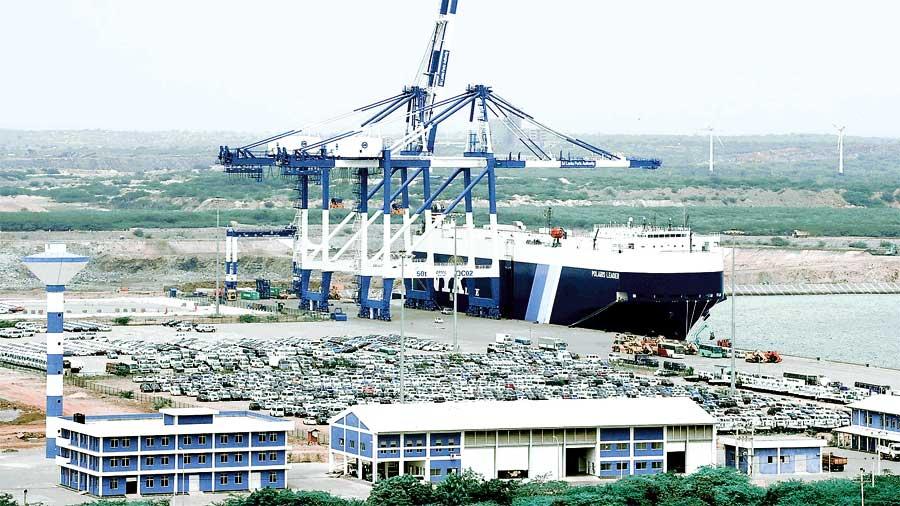
Construction of the Hambantota Port began after obtaining a loan of 1320 million US$ from China
Many of the projects aimed at developing the country have only become a burden to the regime. Mattala Airport,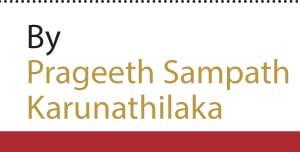 Lotus Tower, the Conference Hall in Hambantota, Sooriyawewa Stadium and the expressways are fine examples for such questionable projects. Debts were obtained from foreign countries amounting to billions of dollars for these development activities. And what’s of concern is that people will have to bear the brunt of such expenses. Any development activity that doesn’t generate income is considered a loss. We have come to realise recently that some of these projects are actually not essential for the country. Due to different opinions people have on these so-called development activities it is hard to believe that that the monies raised through debts were spent on these projects after all.
Lotus Tower, the Conference Hall in Hambantota, Sooriyawewa Stadium and the expressways are fine examples for such questionable projects. Debts were obtained from foreign countries amounting to billions of dollars for these development activities. And what’s of concern is that people will have to bear the brunt of such expenses. Any development activity that doesn’t generate income is considered a loss. We have come to realise recently that some of these projects are actually not essential for the country. Due to different opinions people have on these so-called development activities it is hard to believe that that the monies raised through debts were spent on these projects after all.
According to social opinions, almost 50% of the loans obtained for several projects were associated with financial frauds. Many audits done regarding such activities have affirmed that such malpractices amount to millions of rupees. Nearly 200 million dollars were obtained as loans for projects like Hambantota Port, Lotus Tower, the Sooriyawewa Stadium and Mattala Airport. According to talks in the political scene as much as 20% of those monies were paid as commissions.
At present the funds of the Telecommunications Regulatory Commission of Sri Lanka (TRCSL) are used to settle loans obtained to construct the Lotus Tower (Nelum Kuluna); proudly presented as the tallest tower in South Asia. Around 5 million dollars are paid as loan installments every six months despite the project not generating income, according to a TRCSL spokesperson. “103.4 million US$ was obtained as a loan from China to be repaid within 10 years. It was 2.4 billion in rupees. According to the available data, the loan should be settled with The Exim Bank of China and a sum of 20 million rupees had been paid to an undisclosed company,” he added.
"According to the available data, the loan should be settled with The Exim Bank of China and a sum of 20 million rupees had been paid to an undisclosed company"
The construction activities of the Lotus Tower have been done according to a tri-party agreement. A sum of 2000 million rupees, paid as an advance according to the agreement, could be traced to this day, according to our spokesperson. According to the details available, a single person, who may have obtained that amount, cannot be traced. “The Exim Bank granted 12 billion rupees despite agreeing to pay 16 billion rupees. As the total amount was not offered, the TRCSL had to provide the remaining amount,” he added.
The COPE revealed that during the period 2014-2015 the prodigal expenditure of the country was 111000 million rupees and the Road Development Authority (RDA) had spent 57000 million rupees on irrelevant projects. The COPE report also stated that the 5000 million rupees spent on constructing the Sooriyawewa Stadium was a prodigal expenditure.
 Construction of the Hambantota Port began after obtaining a loan of 1320 million US$ from China. It is the largest port in South Asia built on land. According to port sources the expenditure incurred for the first phase of the construction of the port- spanning 400 acres- was 360 million US$. This was obtained from The Exim bank of China at an interest of 6.3%. The construction of the bunker terminal alone has cost around 77 million US$. 188 million rupees was spent on opening only the first phase of the port. 810 million US$ was obtained to construct the second phase of the port. According to a port spokesperson 40 million US$ had been spent to remove a rock in the port.
Construction of the Hambantota Port began after obtaining a loan of 1320 million US$ from China. It is the largest port in South Asia built on land. According to port sources the expenditure incurred for the first phase of the construction of the port- spanning 400 acres- was 360 million US$. This was obtained from The Exim bank of China at an interest of 6.3%. The construction of the bunker terminal alone has cost around 77 million US$. 188 million rupees was spent on opening only the first phase of the port. 810 million US$ was obtained to construct the second phase of the port. According to a port spokesperson 40 million US$ had been spent to remove a rock in the port.
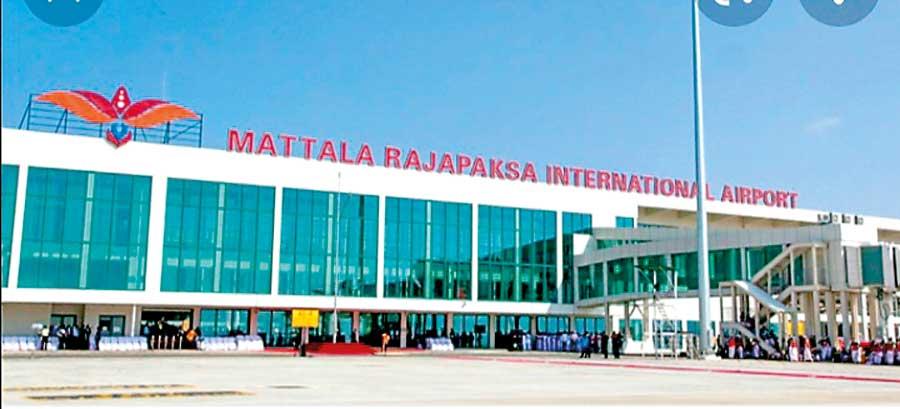
The total expenditure incuured to construct the Mattala International Airport was 2010 million US$
The total expenditure to construct the Mattala International Airport was 2010 million USD. This was only the estimated amount. According to an airport spokesman around 20% of the total sum had formed the commission.
According to RDA reports, massive corruptions had taken place during the construction of expressways. Matara-Mattala Expressway is 96 kilometres long and the estimated cost was 242 billion rupees. The estimated cost for consulting and planning was 12 billion rupees. The construction was done in four phases and the estimated cost to construct the 30 kilometres between Matara and Beliatta was 103.28 billion rupees, the 26 kilometres between Beliatta and Wetiya was 55.5 billion rupees, the 15 kilometres between Wetiya and Andara Wewa was 31.57 billion rupees and the 25 kilometres between Andara Wewa and Hambantota and Mattala was 52.16 billion rupees.
This amount was reviewed only during the Yahapalana Government. It was revealed that another 40% had been added to the actual cost of the contractor. The actual cost for the construction of this expressway was not 103 billion rupees, but 89.9 billion rupees, as recommended, a top official in charge of expressway constructions affirmed.
According to him, the second phase of the expressway from Beliatta to Watiya was to be constructed at the cost of 47 billion rupees instead of 55.2 billion rupees and from Watiya to Andara Wewa at 27 billion rupees instead of 31.57 billion rupees. He said that the expressway from Andarawewa to Mattala could be constructed at the cost of 49 billion rupees instead of 52.16 billion rupees. Instead the cost of the Matara-Beliatta Road increased from 103.28 billion rupees to 122.5 billion rupees. “This was a 20-25% increase, according to the official. The cost of construction from Beliatta–Watiya increased from 55.2 billion rupees to 66.83 billion rupees and Watiya – Andarawewa from 31.57 billion rupees to 39.97 billion rupees,” he added.
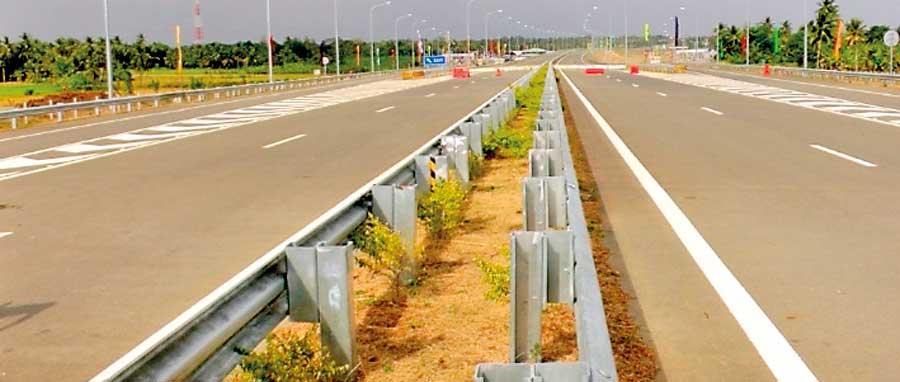
Hambantota Expressway
Lands taken over
The estimated cost of the construction of the 79.9 kilometre stretch from Kahatuduwa to Pelmadulla through Horana was 275 billion rupees. According to the Environmental Impact Assessment report and Economic Feasibility Study report lands had been taken over before the construction of the road, the RDA officer added. Those lands had been taken over as an urgent requirement as per Paragraph 38(A) of the Land Acquisition Act. He also added that the RDA had paid 134 million rupees to a consulting firm to conduct the feasibility study for the project.
The distance from Kadawatha to Mirigama on the Central Expressway is 37 kilometres, from Mirigama to Kurunegala, 39.29 kilometres, from Pothuhera to Galagedara 32.5 kilometres, from Kurunegala to Dambulla 60.3 kilometres. The cost of the project is 160.8 billion rupees. The price does not include taxes. An officer attached to the Central Expressway said that according to current prices the expenditure should be higher. A special audit was conducted with regards to this project in 2018. According to the special audit report, made back then regarding this expressway, the public had lost 2193 million rupees from the construction activities of the expressway which were yet to begin. Our spokesperson said that the country made that loss because politicians and several officers were involved in financial frauds. According to this audit report the construction had begun without conducting a proper feasibility study and the construction was delayed as a result.
Sweden and the Swedish International Development Cooperation Agency have offered 119 million rupees for the feasibility study on the Central Expressway. According to the audit report the RDA is yet to reveal the manner in which 85 million rupees of that grant had been spent.
Cabinet approval was given for the construction of the Central Expressway in 2003. An agreement was entered into with a private company in Malaysia, but the authorities had not disclosed any details relating to the deals with the said company during the audit, the report said.
"The cost of construction from Beliatta–Watiya increased from 55.2 billion rupees to 66.83 billion rupees and Watiya – Andarawewa from 31.57 billion rupees to 39.97 billion rupees"
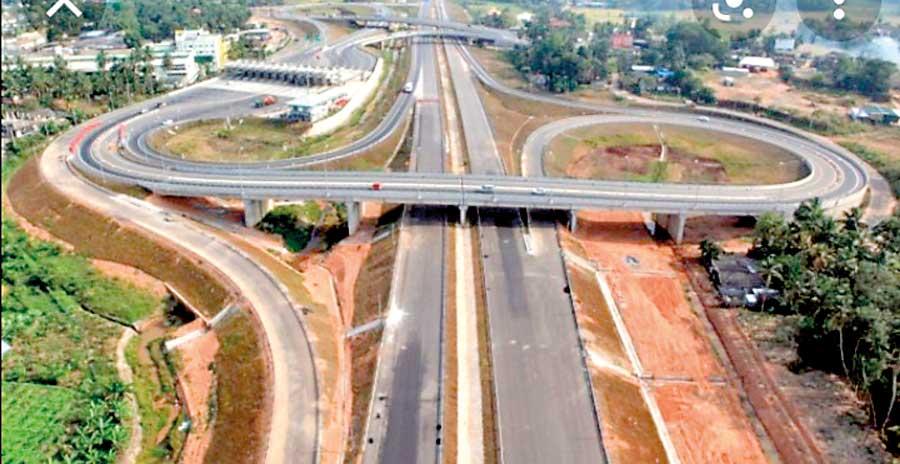
Sweden and the Swedish International Development Cooperation Agency offered 119 million rupees for the feasibility study on the Central Expressway
A project management unit was established to handle the deals with the Malaysian company. The amount spent on maintaining the staff attached to that unit was 284 million rupees. According to the audit report rupees 369 million incurred as expenses and associated with this project hasn’t been indicated in these accounts.
The report also mentions that the construction activities of the first phase of the Central Expressway- from Kadawatha to Mirigama- were given to the MCC company for 158386 million rupees against the procurement policies. In addition the cabinet memorandum presented by Prime Minister Ranil Wickremasinghe on July 6 2015 received approval on July 16.
When inquired, a top official in charge of the expressways said that he was powerless to provide details with regard to this project. He told this writer to contact the RDA Director General for details. However attempts made to contact the RDA Director General proved futile.
This newspaper then attempted to contact relevant parties regarding corruptions related to the construction of Hambantota and Mattala airport. Ports Authority Chariman Dr. Prasanna Jayamanna could not be contacted despite several attempts made to reach him via mobile phone. When contacted, an officer of the Civil Aviation Services Ministry asked this writer to obtain details from the media division whose officials also could not be contacted.
An officer in charge of the Lotus Tower gave a phone number to contact the TRCSL Director General. However the number was not in use. When a second attempt was made to reach the director general he was not present in office. The officers there obtained the author’s number with the promise of returning our call but the promise wasn’t met.
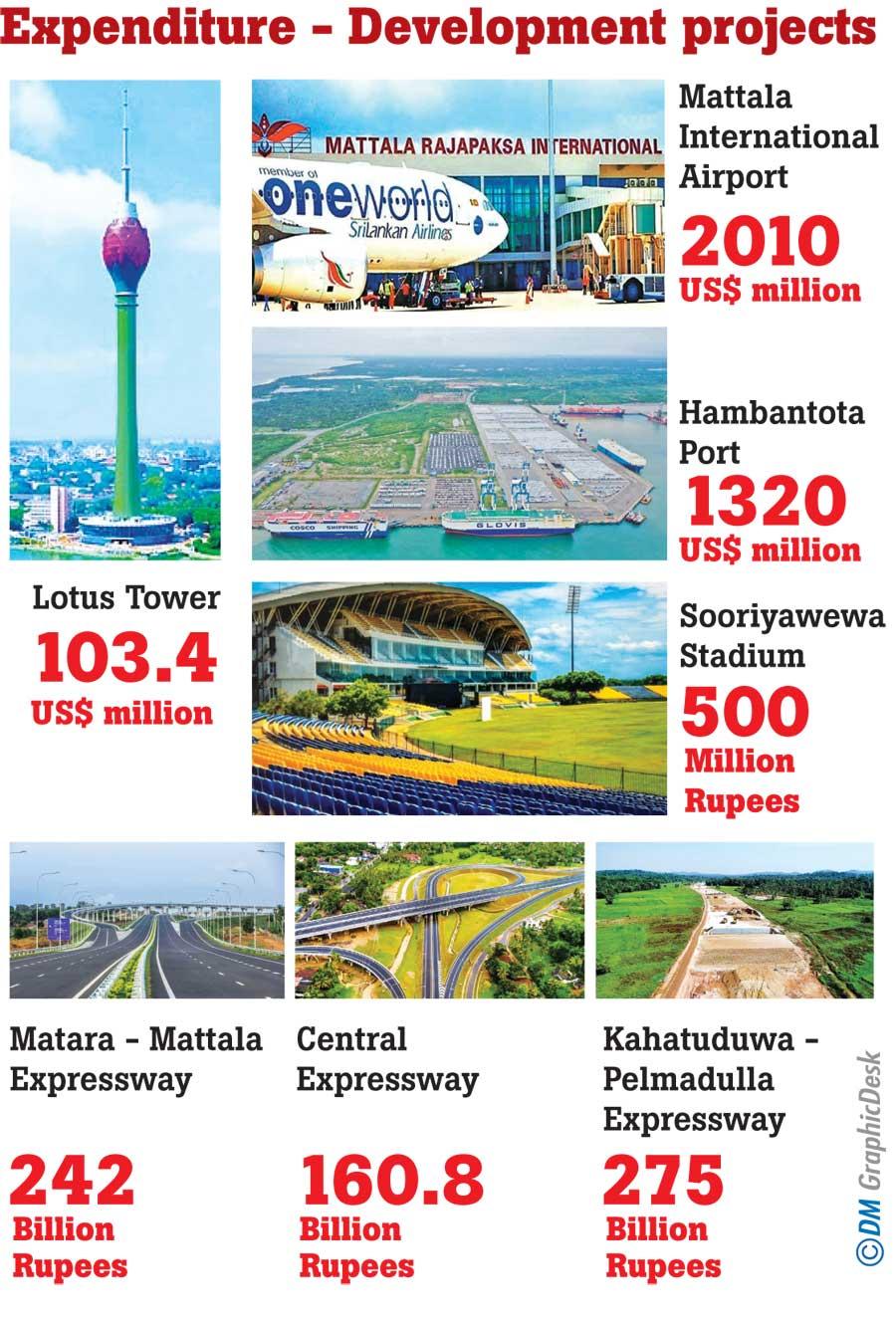
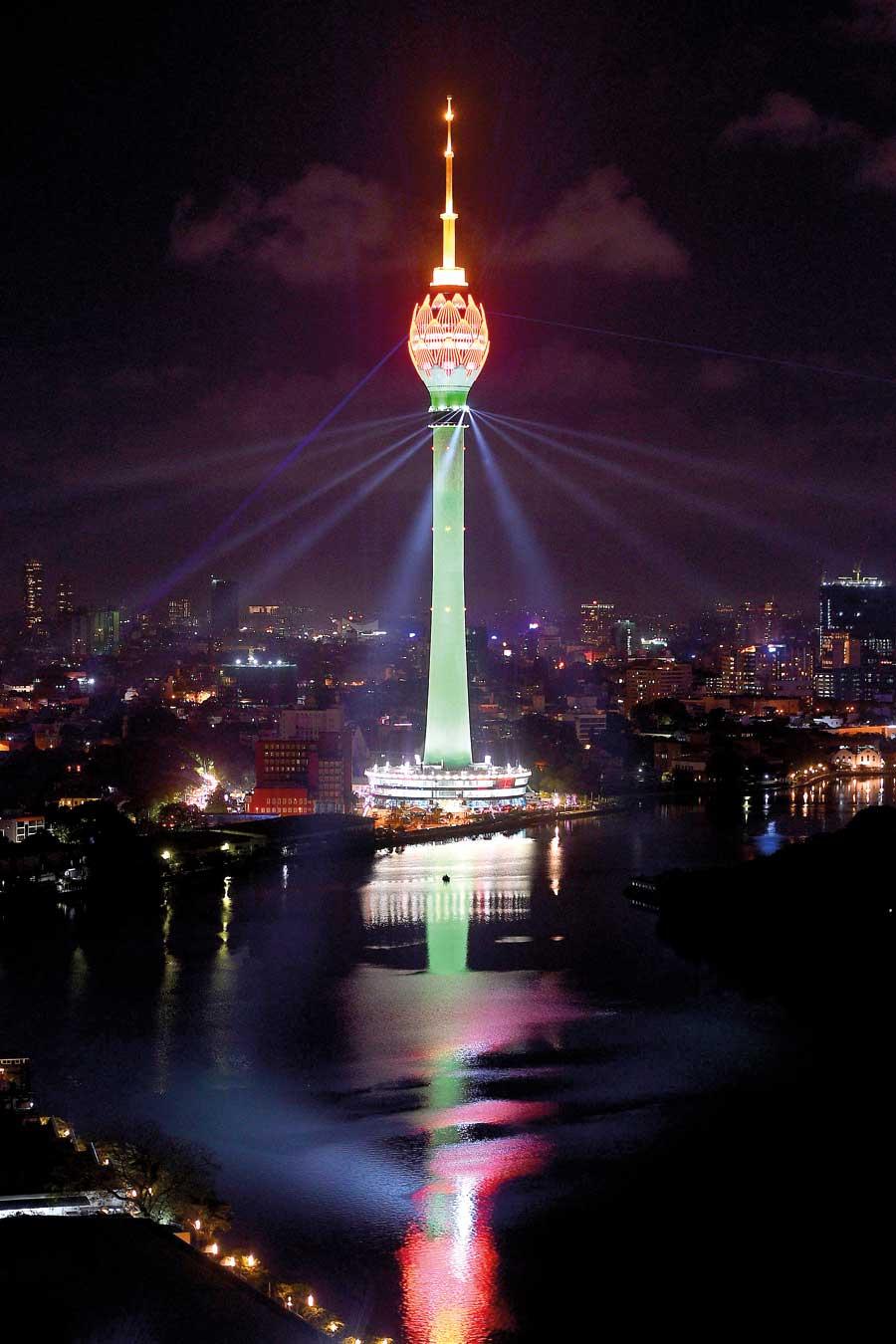
Lotus Tower